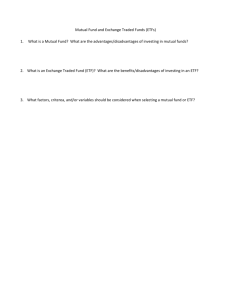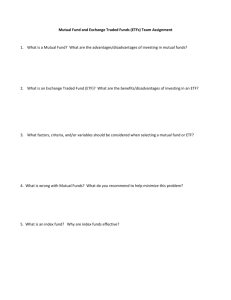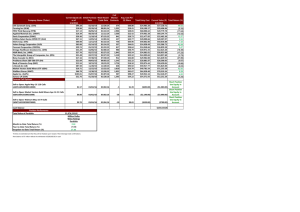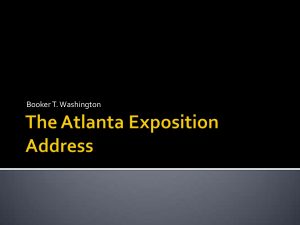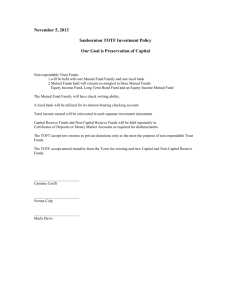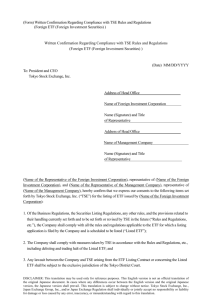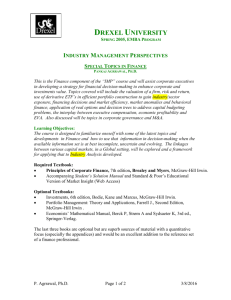Group D - Module 6
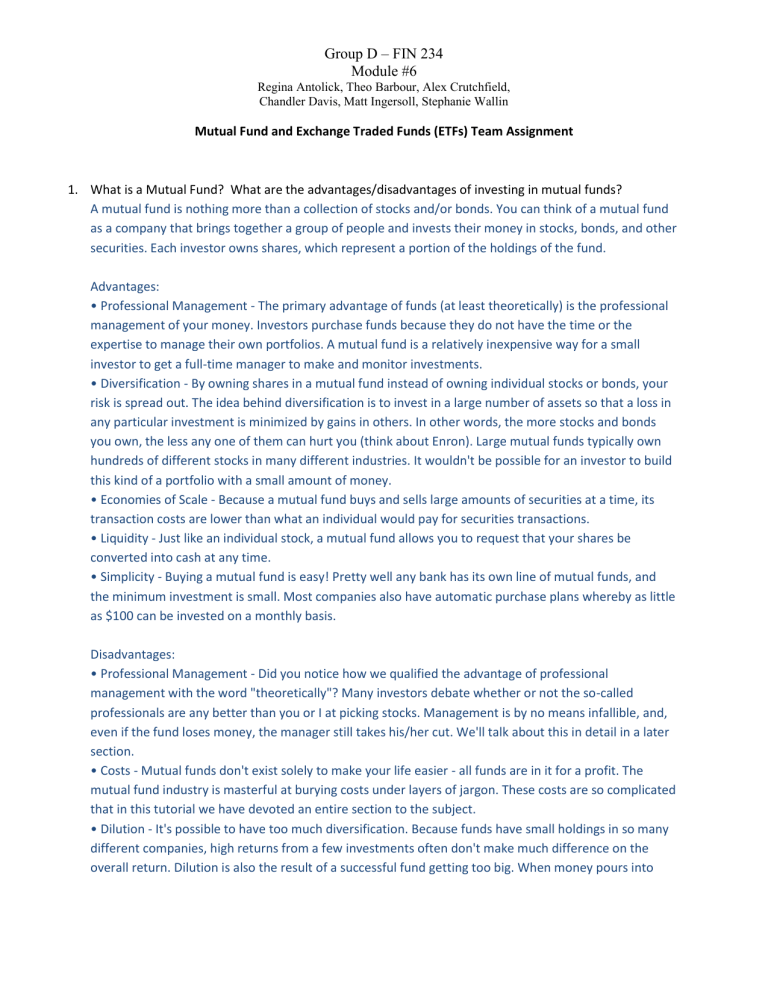
Group D – FIN 234
Module #6
Regina Antolick, Theo Barbour, Alex Crutchfield,
Chandler Davis, Matt Ingersoll, Stephanie Wallin
Mutual Fund and Exchange Traded Funds (ETFs) Team Assignment
1.
What is a Mutual Fund? What are the advantages/disadvantages of investing in mutual funds?
A mutual fund is nothing more than a collection of stocks and/or bonds. You can think of a mutual fund as a company that brings together a group of people and invests their money in stocks, bonds, and other securities. Each investor owns shares, which represent a portion of the holdings of the fund.
Advantages:
• Professional Management - The primary advantage of funds (at least theoretically) is the professional management of your money. Investors purchase funds because they do not have the time or the expertise to manage their own portfolios. A mutual fund is a relatively inexpensive way for a small investor to get a full-time manager to make and monitor investments.
• Diversification - By owning shares in a mutual fund instead of owning individual stocks or bonds, your risk is spread out. The idea behind diversification is to invest in a large number of assets so that a loss in any particular investment is minimized by gains in others. In other words, the more stocks and bonds you own, the less any one of them can hurt you (think about Enron). Large mutual funds typically own hundreds of different stocks in many different industries. It wouldn't be possible for an investor to build this kind of a portfolio with a small amount of money.
• Economies of Scale - Because a mutual fund buys and sells large amounts of securities at a time, its transaction costs are lower than what an individual would pay for securities transactions.
• Liquidity - Just like an individual stock, a mutual fund allows you to request that your shares be converted into cash at any time.
• Simplicity - Buying a mutual fund is easy! Pretty well any bank has its own line of mutual funds, and the minimum investment is small. Most companies also have automatic purchase plans whereby as little as $100 can be invested on a monthly basis.
Disadvantages:
• Professional Management - Did you notice how we qualified the advantage of professional management with the word "theoretically"? Many investors debate whether or not the so-called professionals are any better than you or I at picking stocks. Management is by no means infallible, and, even if the fund loses money, the manager still takes his/her cut. We'll talk about this in detail in a later section.
• Costs - Mutual funds don't exist solely to make your life easier - all funds are in it for a profit. The mutual fund industry is masterful at burying costs under layers of jargon. These costs are so complicated that in this tutorial we have devoted an entire section to the subject.
• Dilution - It's possible to have too much diversification. Because funds have small holdings in so many different companies, high returns from a few investments often don't make much difference on the overall return. Dilution is also the result of a successful fund getting too big. When money pours into
Group D – FIN 234
Module #6
Regina Antolick, Theo Barbour, Alex Crutchfield,
Chandler Davis, Matt Ingersoll, Stephanie Wallin funds that have had strong success, the manager often has trouble finding a good investment for all the new money.
• Taxes - When making decisions about your money, fund managers don't consider your personal tax situation. For example, when a fund manager sells a security, a capital-gains tax is triggered, which affects how profitable the individual is from the sale. It might have been more advantageous for the individual to defer the capital gains liability.
2.
What is an Exchange Traded Fund (ETF)? What are the benefits/disadvantages of investing in an ETF?
A security that tracks an index, a commodity or a basket of assets like an index fund, but trades like a stock on an exchange. ETFs experience price changes throughout the day as they are bought and sold.
Advantages:
• Convenience: Investing in ETFs are as easy as investing in stocks. You just need to buy one as you would buy any regular stock.
• Low fees. Like index fund, ETFs have low fees. You can expect the management fee to be about .1% for
S&P 500 trackers like IVV and SPY. The management fees are higher for more exotic ETFs like the Russell
2000 Index ETF (IWN) and Vanguard Emerging Markets ETF (VWO).
• Tax efficient. There are no unexpected capital gains/losses when you purchase an ETF. Sell when taxwise it makes the most sense to you.
Disadvantages
• Convenience. The ease of buying/selling an ETF means you might sell an ETF when you later believed you should have held on. Of course, solid investment discipline will avoid this disadvantage.
• Market spread. If you are buying a rare ETF, the buy/ask spread might be somewhat significant. This can be avoided if you invest in the major ETFs.
• Index fund disadvantages. Since you gain the advantages of an index fund (like low fees), you also receive most of the disadvantages as well. Because an ETF blindly follows an index, it means it holds shares of stocks you might not like that happen to be in that index.
3.
What factors, criteria, and/or variables should be considered when selecting a mutual fund or ETF?
How much risk you want to take, history of the return on investment and the return on investment you want, current trading prices, what areas the fund or ETF is in (asset), and trading and volume.
4.
What is wrong with Mutual Funds? What do you recommend to help minimize this problem?
In part, they charge too much for their service, they often stick investors with unwanted tax bills, and the fund companies themselves have flooded the marketplace with products that are often difficult to differentiate and understand. In order to minimize this problem as an investor take the time to understand the fund you are investing in and also try to negotiate the price.
5.
What is an index fund? Why are index funds effective?
Group D – FIN 234
Module #6
Regina Antolick, Theo Barbour, Alex Crutchfield,
Chandler Davis, Matt Ingersoll, Stephanie Wallin
A passively managed mutual fund that tries to mirror the performance of a specific index, such as the
S&P 500. Since portfolio decisions are automatic and transactions are infrequent, expenses tend to be lower than those of actively managed funds.
6.
What is the difference between a no load and load mutual fund? Do you recommend a load or no load?
Load funds charge a commission while no-load funds are commission-free. The structure of load funds can be (1) front-end with the commission varying from 3 to 6.25 percent of the investment, or (2) backend, also known as redemption, with the commission usually at 3 percent of asset value when sold. In addition, practically all load funds charge annual distribution fees, also referred to as 12b-1 fees, which are used to pay for promotional costs. These costs vary from 0.25 to 0.75 percent of annual asset value.
Some no-load funds also charge 12b-1 fees, but no-load funds that do not charge 12b-1 fees are known as 100 percent no-load or true no-load.
We would recommend the no-load fund because they can be 100% fee free!
7.
What is a “Family of Funds” or “Funds Family”? Provide an example.
A mutual fund company offering many mutual funds, for various objectives. Usually, investors can move assets between different funds of a family of funds at little or no cost, and can receive a single statement describing their holdings in all the funds in the family of funds.
American Family Funds
Domestic Stock (Equity) - Matt
Category
Small-Cap-Value
Small Cap-Growth
Mid Cap- Value
Mid Cap-Growth
Large Cap-Value
Large Cap-Growth
Select one mutual fund or ETF that you would recommend in one of these categories. Justify your selection based on the expense ratio, tax efficiency, management, and/or any other criteria.
Vanguard capital opportunity investments (VHCOX). YTD return 34.78% with a Morningstar rating of five stars. There are no sales charges (front or deferred). The expense ratio is 0.45%. Five year after tax return is 5.15% and 10 year is 6.89%.
What are the top three holdings in the mutual fund or ETF you are recommending?
CMT Market Liquidity Rate, Research In Motion Limited, & MONSANTO COMPANY
Group D – FIN 234
Module #6
Regina Antolick, Theo Barbour, Alex Crutchfield,
Chandler Davis, Matt Ingersoll, Stephanie Wallin
International Stock (Equity) - Chandler
Category
International
Foreign
Europe
Diversified Pacific/Asia
Latin America
Diversified Emerging
Markets
Global Real Estate
Select one mutual fund or ETF that you would recommend in one of these categories. Justify your selection based on the expense ratio, tax efficiency, management, risk, and/or any other criteria. iShares MSCI Singapore Index - EWS
FUND OPERATIONS
Total Expense Ratio: 0.52%
Annual Holdings Turnover: 16%
Total Net Assets: 1.31B
This Index Fund has a relatively low expense ratio and its annual holdings turnover is 16%. For the current market this index is doing well. Its YTD return is 31.83% and it’s 5 year average return is 12.24%.
This fund has been going up steadily over time and appears to be a good investment based on these numbers.
What are the top three holdings in the mutual fund or ETF you are recommending?
1. Capitaland, C31.SI, 4.4
2. DBS, D05.SI, 12.84
3. Keppel, N/A, 4.99
Group D – FIN 234
Module #6
Regina Antolick, Theo Barbour, Alex Crutchfield,
Chandler Davis, Matt Ingersoll, Stephanie Wallin
Bonds (Debt) - Stephanie
Category
Short Term Government
Intermediate Government
Long Term Government
Short Term (Corporate) Bond
Intermediate Term (Corporate) Bond
Long Term (Corporate) Intermediate
Bond
High Yield Bond
Municipal Bond
Inflation Protected – TIPS (US Treasuryissued inflation protection
Select one mutual fund or ETF that you would recommend in one of these categories. Justify your selection based on the expense ratio, tax efficiency, management, risk, and/or any other criteria.
The ETF that I would recommend would be the Vanguard Short-Term Bond ETF. It is quite a large fund, with more than 9 billion dollars in assets. Vanguard is known as one of the highest quality equity and fixed-income managers, so I would have complete confidence going with this ETF. Additionally, their expense ratio is only 0.14%, which is relatively cheap for a short-term corporate ETF. Additionally, in this economy a short-term bond is going to carry less risk than a long-term bond.
What are the top three holdings in the mutual fund or ETF you are recommending?
The top three holdings are all U.S. Treasury notes, which is common for short-term bonds. They also have holdings in industrial, finance, and foreign markets.
Who would typically invest in a municipal bond fund? Why?
Generally speaking, someone would invest in a municipal bond fund if they are in a certain type of tax bracket or state where they are heavily taxed on other bond funds. Generally speaking, this will be an investor in a higher tax bracket. Municipal bond funds are exempt from income taxes, so you can save quite a bit of money on the taxes. However, it is a trade-off because municipal bond funds tend to have a lower yield than most taxed funds.
Group D – FIN 234
Module #6
Regina Antolick, Theo Barbour, Alex Crutchfield,
Chandler Davis, Matt Ingersoll, Stephanie Wallin
Equity/Bond Hybrid - Alex
Category
Conservative or Moderate Allocation (Stock/Bond) Mix
Target Date
Select one mutual fund or ETF that you would recommend in one of these categories. Justify your selection based on the expense ratio, tax efficiency, management, risk, and/or any other criteria.
VFSTX, short-term bond that is very conservative. The expense ratio is .26% and it is a very low risk investment with relatively low return. It is a seeking safety ETF.
What are the top three holdings in the mutual fund or ETF you are recommending?
All three are U.S. treasury notes.
Specialty Stock – Regina
Category
Natural Resources
Technology
Health
Financial
Real Estate
Select one mutual fund or ETF that you would recommend in one of these categories. Justify your selection based on the expense ratio, tax efficiency, management, risk, and/or any other criteria.
I chose Technology: 5Star Science and Technology Advance (AFATX)
This is a low risk ETF stock with an average return. It has a high turnover rate at 49%and a high expense ratio of 1.75, which is above the average expense. The performance of this stock has been above the average category of other stocks in this area except for the first year. This stock has 16% of its assets in the top holdings.
What are the top three holdings in the mutual fund or ETF you are recommending?
Citrix Systems Inc., Cree Inc., and Cisco Systems Inc.
Group D – FIN 234
Module #6
Regina Antolick, Theo Barbour, Alex Crutchfield,
Chandler Davis, Matt Ingersoll, Stephanie Wallin
Group D – FIN 234
Module #6
Regina Antolick, Theo Barbour, Alex Crutchfield,
Chandler Davis, Matt Ingersoll, Stephanie Wallin
Alternative - Theo
Category
Currency
Long-Short
Precious Metals
Bear Market
Select one mutual fund or ETF that you would recommend in one of these categories. Justify your selection based on the expense ratio, tax efficiency, risk, management, and/or any other criteria.
AIM Cold and Precious metals A – IGDAX, Expense Ratio 1.46% - Pretty high but manageable. Turnover
39% - a little high for taxes. Risk is average; not too high and not too low. This should be easy to manage overall and the fund percentage grows for you.
What are the top three holdings in the mutual fund or ETF you are recommending?
Aim Treasurers Ser Tr, AIM STIT Liquid Assets Inst, GOLDCORP INC
What else would you like to know about this subject?
